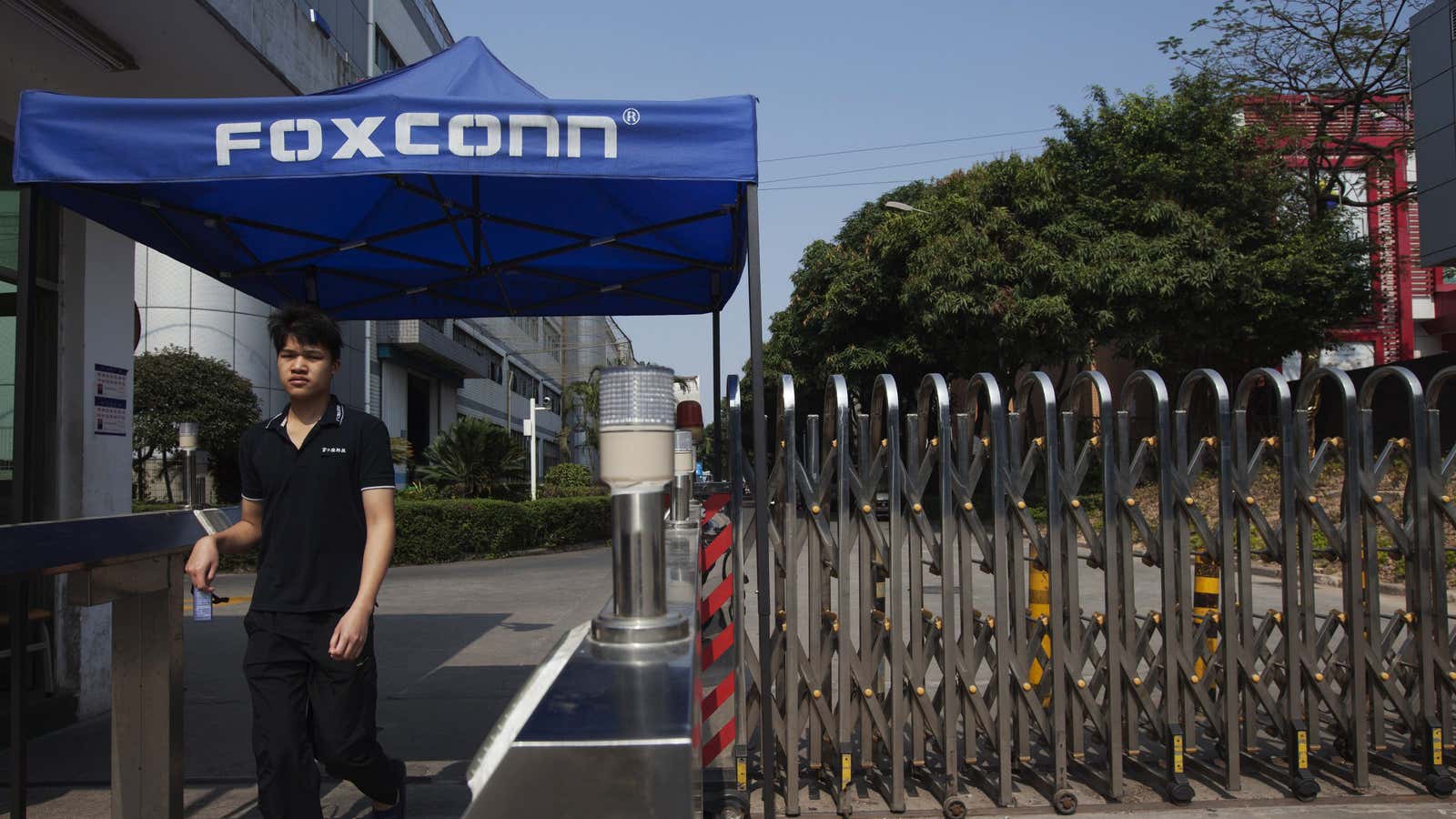Most workers in Apple’s largest iPhone factory are struggling enough that lack of overtime hours is a punishment—and excessive overtime on all phones spiked in the months just after Apple’s last iPhone launch.
Those findings, just ahead of Apple’s iPhone 11 launch tomorrow (Sept. 10), come from a yearlong investigation by China Labor Watch conducted by multiple investigators who worked undercover at Foxconn’s largest iPhone factory in China, its Hengfujin unit in central Zhengzhou. It’s one of three subsidiaries in the area run by Foxconn, or Hon Hai Precision Industry, as the Taiwanese firm is formally known, and as of August had 150,000 workers.
The report from the New York-based nonprofit provides a rare detailed look at China’s overwork problems, already drawing renewed attention in recent weeks after the Netflix release of American Factory, a documentary backed by the Obamas that looks at a US factory under its new Chinese management. Apple has faced criticism over poor labor for years over its supply chain, and has been releasing “supplier responsibility” reports to showcase its progress in training and ensuring safe workplaces.
The CLW report presents a picture of ongoing problems. Investigators, including one who worked at the plant for more than four years, detailed how the Foxconn factory used overtime hours both as a reward, and as a mandatory requirement. Workers often want overtime because their monthly base pay, at around 2,100 yuan ($300), is low, while overtime hours are paid at 1.5 normal hourly weekday wages.
One of the ways in which overtime is used to punish is linked to referrals. Workers in the factory have been required to refer others to join the factory since 2016. The report says it’s mandatory to make referrals when the factory needs workers most—usually in August to October, or about the time every year Apple releases new iPhone models. “If a worker refuses to refer others to work at the factory, they will receive fewer overtime working hours in the following weeks. Fewer overtime hours is seen as a punishment for many workers, as the base wage is pittance,” reads the report.
“The work is grueling but we still hope to do overtime work because that’s the only way we can earn more than 3,000 yuan ($420) per month. Whoever wants to live an exhausting life? What pushes us to work overtime is not the factory but life itself,” a worker told one investigator.
Foxconn makes the line production leader’s bonus dependent on his or her workers meeting the monthly referral quota—usually six or seven per individual, the report said. The leader passes the pressure on to line workers, threatening fewer overtime hours for those who fail to deliver. “Some workers would go to the extreme and pay others to be hired into the factory in order to meet the quotas so that they can work overtime,” said the report.
The constant fear of not having overtime work makes sure factory workers behave. “Workers have to be careful when they chat during work. They are not allowed to chat too obviously,” reads the report. In addition, a worker who takes excessive bathroom breaks—more than two in the course of a morning for example—could be assigned to more tiring work, or not allowed overtime. Workers work at least 100 overtime hours a month during peak production season, CLW said, while China’s labor law says workers should now work more than 36 hours of overtime. One of the investigators reported working 130 hours of overtime to manufacture the iPhone XS in October 2018.
Not all overtime work is compensated, however. For instance, workers sometimes need to work unpaid hours to complete the production quota designated for their shift—each shift produces 11,000 iPhones during peak seasons and around 3,000 units for the rest of the time.
The report also found that more than half of the plant’s 150,000 workers were “dispatch” workers whose contracts aren’t with Foxconn but with local labor companies. That’s more than five times more the number of temporary workers allowed in a company under Chinese labor law.
Apple said it looked into the complaints raised by CLW and said it found “most of the allegations are false,” but did admit that its own investigation showed the percentage of temporary workers exceeded its standards and that it is working with Foxconn to address the issue. “We have confirmed all workers are being compensated appropriately, including any overtime wages and bonuses, all overtime work was voluntary and there was no evidence of forced labor,” read the statement from Apple. It didn’t respond to follow-up questions from Quartz seeking clarifications about the allegations.
Foxconn said it had carried out a review that identified “some workforce compliance issues” at the Zhengzhou that it was working to address. “We did find evidence that the use of dispatch workers and the number of hours of overtime work carried out by employees, which we have confirmed was always voluntary, was not consistent with company guidelines.” It said it found no evidence of forced labor, and that it wages and benefits “significantly exceed” those mandated by Chinese law.
This is far from the first time Foxconn’s factory practices have been put under a spotlight. A spate of suicides at its factories in 2010 first drew global attention to working conditions for iPhones outsourced to China. As recently as January of last year, a temporary 31-year-old worker jumped to death from an apartment complex at the Zhengzhou factory.
Update: This story was updated on the day of publication with comment from Foxconn.
